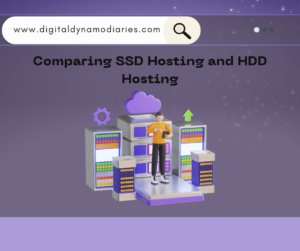The Role of Web Hosting on Website Monetization
In today’s digital landscape, an effective online presence can make or break a business. The role of web hosting extends far beyond mere storage and accessibility. Choosing the right web hosting service is a strategic decision that can significantly impact your website’s performance, user experience, and ultimately, its monetization potential. This article delves into how strategic web hosting choices can enhance your website monetization, ensuring you capitalize on every opportunity.
Understanding Web Hosting
Web hosting services provide the infrastructure and technology necessary to make your website accessible on the internet. These services store your site’s files on servers and manage the backend resources required to maintain an online presence. While the primary function of web hosting is to ensure that your site is live and accessible, its influence on website performance and monetization is far-reaching and multifaceted.
Types of Web Hosting
Choosing the right type of web hosting is crucial for optimizing your website’s performance and monetization. Here’s an in-depth look at the various types of web hosting available:
Shared Hosting
Shared hosting is a cost-effective solution where multiple websites share the same server resources. It is often the first choice for beginners and small businesses due to its affordability and ease of use. However, because resources such as CPU, RAM, and bandwidth are shared among all the websites on the server, performance can suffer, especially during traffic spikes. This can lead to slower load times and potentially higher bounce rates, negatively impacting your site’s monetization efforts.
VPS Hosting
Virtual Private Server (VPS) hosting offers a middle ground between shared and dedicated hosting. In VPS hosting, your website is hosted on a virtual machine that mimics a dedicated server environment, but within a shared server. This setup provides more dedicated resources, better performance, and increased control compared to shared hosting. VPS hosting is ideal for growing websites that need more power and flexibility without the high costs associated with dedicated servers.
Dedicated Hosting
Dedicated hosting involves leasing an entire server exclusively for your website. This option offers maximum performance, security, and customization possibilities. With dedicated hosting, you have full control over server configuration and resource allocation, ensuring optimal performance. This type of hosting is perfect for large, traffic-heavy websites that require high availability and reliability. However, it comes at a higher cost and requires more technical expertise to manage effectively.
Cloud Hosting
Cloud hosting uses a network of virtual servers to host websites, ensuring high availability and scalability. This hosting solution distributes your site’s resources across multiple servers, reducing the risk of downtime due to server failures. Cloud hosting can handle traffic spikes efficiently, making it suitable for e-commerce sites and businesses with fluctuating traffic patterns. Its pay-as-you-go pricing model also allows for cost-effective scaling.
Managed Hosting
Managed hosting services include comprehensive server management, maintenance, security, and backups. This type of hosting is ideal for website owners who prefer to focus on content and business operations rather than technical details. Managed hosting ensures optimal performance and security through professional management, which can directly influence your website’s monetization success by providing a seamless user experience.
How Web Hosting Affects Website Monetization
The choice of web hosting has a direct impact on several factors that influence website monetization. Let’s explore these critical aspects:
Site Speed and Performance
Web hosting plays a pivotal role in determining your website’s speed and performance. A fast-loading site enhances user experience by reducing wait times, which is crucial for retaining visitors and encouraging them to explore your site further. Slow-loading pages can frustrate users, leading to higher bounce rates and lower engagement. Search engines like Google also prioritize fast websites in their search rankings, driving more organic traffic to your site. Increased traffic and better user engagement directly contribute to higher ad impressions, click-through rates, and ultimately, revenue.
Uptime and Reliability
Frequent downtime can damage your site’s reputation and lead to lost revenue opportunities. Reliable web hosting services guarantee high uptime, ensuring your site remains accessible to users around the clock. This reliability is crucial for maintaining consistent revenue streams, especially for e-commerce websites and those reliant on ad revenue. Downtime can disrupt sales, lower search engine rankings, and erode user trust, all of which can significantly impact your monetization efforts.
Security
Security breaches can compromise sensitive user data and harm your site’s credibility. Robust web hosting services provide advanced security features, including SSL certificates, firewalls, malware scanning, and regular backups. Ensuring a secure environment not only protects your site and users but also fosters trust, encouraging repeat visits and transactions. A secure website is essential for maintaining customer confidence and complying with data protection regulations, both of which are crucial for successful monetization.
Versatility
As your website grows, so do your hosting needs. Scalable hosting solutions, such as cloud hosting, allow you to accommodate increasing traffic without compromising performance. Scalability ensures that your site can handle peak traffic periods, such as during promotions or viral content, maximizing revenue potential. Scalable hosting solutions also provide the flexibility to adjust resources based on demand, ensuring cost-efficiency while maintaining optimal performance.
SEO and Traffic
Search engine optimization (SEO) is vital for driving organic traffic to your site. Factors like site speed, uptime, and security directly influenced by your hosting choice affect your SEO performance. A well-optimized site ranks higher in search results, attracting more visitors and increasing monetization opportunities through ads, affiliate marketing, or sales. High-quality hosting supports SEO efforts by ensuring fast load times, minimal downtime, and robust security, all of which contribute to a positive user experience and higher search engine rankings.
Choosing the Right Hosting for Monetization
Selecting the optimal web hosting service involves assessing your site’s specific needs and future growth plans. Consider the following factors:
1. Traffic Volume: Estimate your current and projected traffic to determine the necessary server resources. High-traffic websites require hosting solutions with ample bandwidth and processing power to maintain performance during peak periods.
2. Technical Expertise: Choose between managed or unmanaged hosting based on your technical skills and available support resources. Managed hosting is ideal for those who prefer to outsource server management, while unmanaged hosting offers more control for technically proficient users.
3. Budget: Balance your budget with the required performance, security, and scalability features. While cost is a significant consideration, investing in high-quality hosting can yield substantial returns in terms of improved performance and monetization potential.
4. Content Type: Identify if your site hosts resource-intensive content like videos or applications, which may require more robust hosting solutions. Media-rich websites often benefit from hosting plans that offer high storage capacities and fast data transfer rates.
5. Business Goals: Align your hosting choice with your long-term business goals. Consider how your hosting solution can support your monetization strategy, whether through ad revenue, e-commerce, or subscription models.
Conclusion
Web hosting is a foundational element that can significantly influence your website’s monetization success. By understanding the different types of hosting and their impacts on site performance, security, and scalability, you can make informed decisions that enhance user experience and maximize revenue. Investing in the right web hosting solution is not just a technical decision; it’s a strategic move that can propel your online business to new heights. Choosing the right web hosting service can be the difference between a website that merely exists and one that thrives and generates substantial revenue.




One thought on “The Role of Web Hosting on Website Monetization”